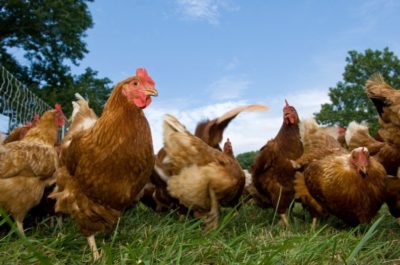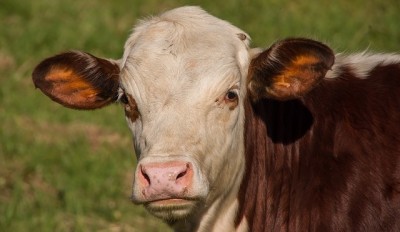To me, one of the most exciting and fun aspects of living in a rural area is raising livestock. For new homesteaders short on money it can be difficult to get into livestock. With some careful research, however, you can find great opportunities to bring home free livestock to get you started.
Where to Find Free Livestock
There are a lot of different ways to find free livestock. Here are some of the main ones:
1. Online classifieds
This is one of my favorite ways and it’s also one of the best ways to find free livestock. There are a few different online classifieds websites, but I find Craigslist.com to be the best resource. Keep an eye on the “Farm & Garden” section as well as the “Free” section. Another online source for free livestock ads is Facebook, specifically Facebook groups for your local area. Many rural areas have their own user-created groups for livestock classifieds.
Keep Your Livestock Healthy With ‘God’s Miracle Dust’!
Sometimes you can find free livestock ads in print in the newspaper, but I find this to be pretty rare since the person would have to pay to publish the ad.
2. Rural farm stores
Local farm stores also can be a source of free livestock. Typically it’s the smaller mom-and-pop style stores versus the large chain stores. One of my local farm stores allows people to bring in free animals to give away during their business hours. I’ve seen everything from barn kittens to chickens and even purebred Nubian bottle babies. Also, check out the bulletin board at the farm store – you can often find free livestock ads there.
3. Word-of-Mouth
If you have a specific type of livestock in mind – like some new laying hens or a dairy goat – simply putting the word out there through friends can really help. You can even ask the owner or manager of a local farm store if they can keep an ear out for what you are looking for or if they know anyone trying to get rid of livestock.
Tips for Finding Healthy Livestock
Here are some quick tips to keep in mind when you are checking out promising free livestock.
1. Thoroughly examine animals
 Always, always thoroughly examine livestock you are interested in – whether it’s a couple of hens or a dairy cow. This doesn’t mean you just look at the animal – you need to physically examine it as well. Run your hands over it to see if it’s in good condition, check the feet and mouth, take note as to whether the animal is easy to handle or familiar with people. Look in its ears and check the eyes. Just because it’s free doesn’t mean you shouldn’t carefully check out the livestock. If you find a problem, ask the owner about it. Minor issues such as slightly overgrown hooves on a goat can be taken care of. But noticeable illness or physical deformities mean you should pass.
Always, always thoroughly examine livestock you are interested in – whether it’s a couple of hens or a dairy cow. This doesn’t mean you just look at the animal – you need to physically examine it as well. Run your hands over it to see if it’s in good condition, check the feet and mouth, take note as to whether the animal is easy to handle or familiar with people. Look in its ears and check the eyes. Just because it’s free doesn’t mean you shouldn’t carefully check out the livestock. If you find a problem, ask the owner about it. Minor issues such as slightly overgrown hooves on a goat can be taken care of. But noticeable illness or physical deformities mean you should pass.
2. Ask questions!
This seems like an obvious tip. But from personal experience, some people hardly ask any questions about the stock. Ask about age, health history, production history, reason for selling, current diet, etc. I find that reputable people should be happy to answer these questions. If you find that the seller avoids answering questions, doesn’t seem to know much about the animal or otherwise can’t help you, be very wary.
3. Take along someone with experience
This is a great tip for people new to livestock, especially when adding large stock to your homestead. Ask a friend who knows what to look for to go along with you to check out a potential animal. They will likely notice things you wouldn’t have or even have their own questions for the seller that you may not have thought of.
4. Avoid playing “animal rescuer”
Sometimes people give away livestock simply because they have no use for it and don’t need monetary compensation. Others may be purposely giving away livestock for the purpose of helping others get their homestead started. Most of the time, though, people are giving away livestock because they don’t have the time or money to care for them. This often leads to free livestock having health problems from neglect. It is really easy to see a sick animal and want to take it home in an effort to make it better.
Everything You Need To Know To Keep A Cow Healthy, Happy, And Productive…
I’ve done this a few times and while on occasion it turned out well, more often than not it just isn’t worth the effort. It’s really difficult, but try to avoid bringing home sick livestock believing that you can make them better. You may get lucky but you’re likely going to end up wasting time and money.
5. Try to visit a person’s home versus meeting elsewhere
If you can go to the person’s home and see what conditions the livestock has been living in, you can get a better idea of how healthy the animal is. Even a fairly healthy looking rabbit or sheep could be a problem if they’ve been living in filth. Ask if you can pick up the animal at the seller’s house. However, I wouldn’t avoid an animal just because a person is not comfortable with a stranger at their house. Just be sure to carefully examine the animal.
6. Ask local friends if seller is reputable
There have been two occasions in which I brought home free livestock (rabbits) that ended up being a problem health-wise. I later found out from friends that the seller is known for selling/giving away sick animals. If you have homesteading friends in your rural area, it doesn’t hurt to ask if they’ve heard of the seller before. It could save you some trouble, especially with large livestock like cows or a horse.
7. Take large animals for a vet check
Yes, it will cost money. But taking large livestock to your vet for a check is never a bad idea. This is a very common practice with horses, but that doesn’t mean you can’t do it with cattle, sheep, goats, llamas, etc. Also, ask the seller if they have any vet/vaccination records on the animal they are giving away.
8. Quarantine ALL new livestock
Finally, before you bring home any free livestock, make sure you have a place to quarantine them away from your current stock. Do this every time, regardless of whether the free animal was a gift from a trusted friend or a pickup from someone you’ve never met.
9. When to avoid free livestock
As awesome as finding free livestock is, there are times when it’s better to spend some money and invest. One situation where this is a good idea is with large livestock that will be giving back for many years – such as cattle, goats, equines, etc. Spending the money to buy quality, well-bred and registered stock may set you back at first but you will have healthier animals and be able to sell the offspring for more.
I’ve found that a lot of fellow homesteaders will happily work with you on the price of their livestock if you talk with them about your passion for homesteading and simply ask. Perhaps they may lower it, allow you to pay off the animal in payments, work off the price or do some trading. Even if they don’t want to budge on the price, sometimes they might take a small down payment and hold the animal while you raise the funds to purchase it in full.
What are some of your free livestock finds? Please share your stories and tips in the comment section below.
 Off The Grid News Better Ideas For Off The Grid Living
Off The Grid News Better Ideas For Off The Grid Living





